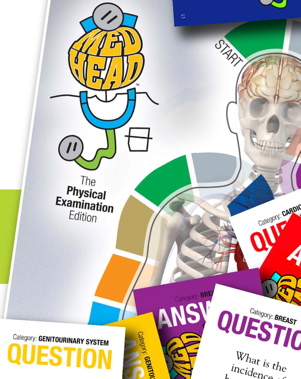The DNA Network |
| iBioSeminars [The Daily Transcript] Posted: 22 Nov 2008 02:22 PM CST I just discovered this great resource - iBioSeminars. It's a web based resource where you can watch some of the most important Cell Biologists give talks on basic research.
The website was the brainchild of Ron Vale. From the latest HHMI bulletin: Vale, of the University of California, San Francisco, also wants to illuminate the colorful side of science, though not quite as literally. His approach: online seminars that reveal scientific fact as well as the not-necessarily smooth process of discovery, the links between fields, and the more personal side of science. Very cool. I encourage you to go there right away and watch some of the most brilliant researchers in science explain the inner workings of life. Read the comments on this post... |
| Think Anatomy: The best resource online [ScienceRoll] Posted: 22 Nov 2008 11:10 AM CST If you want to study anatomy or just find any kind of information, content, material focusing on anatomy, I make your search comfortable: check Think Anatomy. Lectures, podcasts, dissection videos, quizzes and many more. You can also submit your favourite choice. Kudos to Vanessa Ruiz from Street Anatomy for creating this fantastic database.  |
| MedHead: Interactive Learning [ScienceRoll] Posted: 22 Nov 2008 11:00 AM CST We always argued playtime was more important than class time. So here is MedHead, an interactive card game designed for medical students. It’s a really good idea, but I would like to see something similar online as well.
 |
| Posted: 22 Nov 2008 08:54 AM CST So here I am with half an hour to spare, I'll just spew out some thoughts from an incident that occurred a couple of days ago. I was chatting with a science writer and unfurling my usual gripes about science journalism. Very few science writers are willing to tackle ideas originating out of biochemistry, molecular and cell biology. They would rather talk about 'omic research - you know "big biology" projects like the human genome project, ENCODE or the hap map. And when they write about subjects like genomic research, some journalist do a good job explaining the bare minimal basics (along the lines of DNA=>RNA=>protein) while others compose trite articles (such as the "low" number of genes in the human genome). But does any of this mean anything? Can any journalist honestly comment of the # of genes without describing what those genes actually do? And what about the lion's share of the work being done out there? All this cool stuff on what proteins really do. So I was challenged by the guy, what would I write about? There are so many great stories waiting to be discovered when you approach biology from the view point of the cell. Remember a cell is the smallest unit of life. You cannot divide it further and obtain an entity capable of reproduction and self-renewal. The cell is when chemistry meets biology. Look at every major research institution and there are loads of people working on problems involving cells, in fact there are probably more people studying cells then there are people studying physics and chemistry combined. And the problems addressed by cell biology are the very essence of basic research. How do cells talk to each other? How do they divide, how do they KNOW when to divide? How do cells commit suicide? How do cells monitor their size, levels of energy, amount of metabolites? What do all of these processes have to do with cancer? Perhaps one of the most fascinating stories that would be excellent fodder for an article aimed at the lay reader would be how do cells crawl. There is something primal about motion, this process is central to life and it is incredible that a bag of molecules can manage to crawl around towards and away from cues found in the environment that surrounds them. Think of it, a cell is nothing but a bag, densely packed with all sorts of bizarre machines and filaments that act together in concert to propel a cell forward. The writer countered that such an article would describe how protein A binds to protein B that then adds a phosphate to protein C ... and reading the primary literature you would think hat that is all there is. But I have to say that this type of analysis is comparable to describing how a car operates by analyzing every nut and bolt. Biology after all is the study of minutia, and there are so many details that the only way to study cell biological processes is to dissect it down. Very rarely do you have one paper describing a novel finding in cell biology that encapsulates the whole process. You need to immerse yourself in the literature, talk to people doing the work, and all of a sudden a larger picture develops. At that point you realize that there is a better way of describing a motile cell, just like there is a better way of describing how a car works by using broader concepts. Read the rest of this post... | Read the comments on this post... |
| Small changes equal impressive weight loss [The Navigator - Navigenics Blog] Posted: 20 Nov 2008 09:20 PM CST Michael Nierenberg, M.D.
As anyone who has ever looked under their couch cushions for loose coins knows, small change can add up. And when it comes to losing weight, small changes can also make a big difference. In fact slow and steady is the best way to sustain weight loss. Thing is, many dieters unsuccessfully attempt a major makeover of their eating habits, giving up all pleasurable foods or starving themselves to reduce their calorie intake – and their waistline. Those strategies, however, are generally not ones people are able to stick with for a long time. So more often than not, the diet ends and the weight slowly (or not so slowly) comes back on, and the health benefits gained from weight loss slip away. My "radical" suggestion is to consider something not at all radical: Making small, simple changes for life. Not only are they the easiest to attempt, they are also often the most successful.
|
| You are subscribed to email updates from The DNA Network To stop receiving these emails, you may unsubscribe now. | Email Delivery powered by FeedBurner |
| Inbox too full? | |
| If you prefer to unsubscribe via postal mail, write to: The DNA Network, c/o FeedBurner, 20 W Kinzie, 9th Floor, Chicago IL USA 60610 | |



 I call it the "nickel and dime" approach to losing weight.
I call it the "nickel and dime" approach to losing weight.
No comments:
Post a Comment